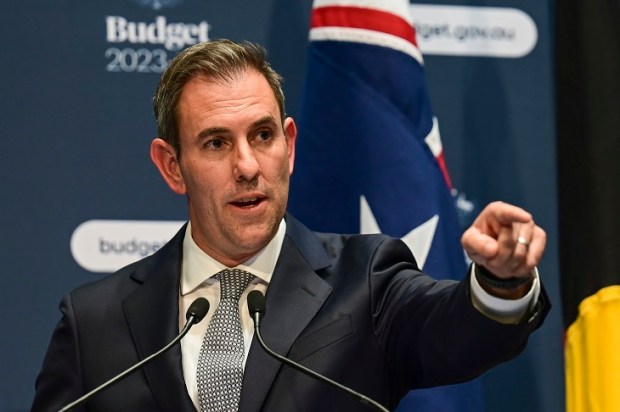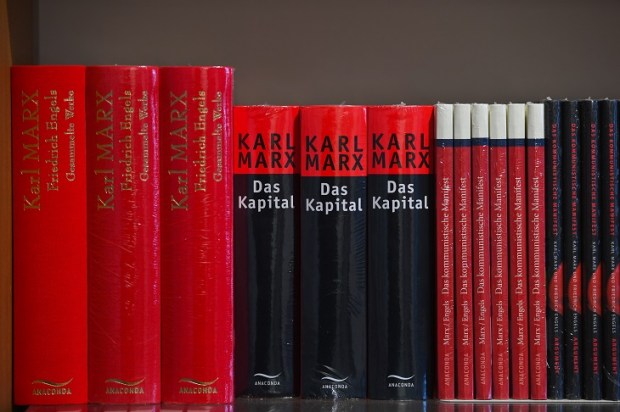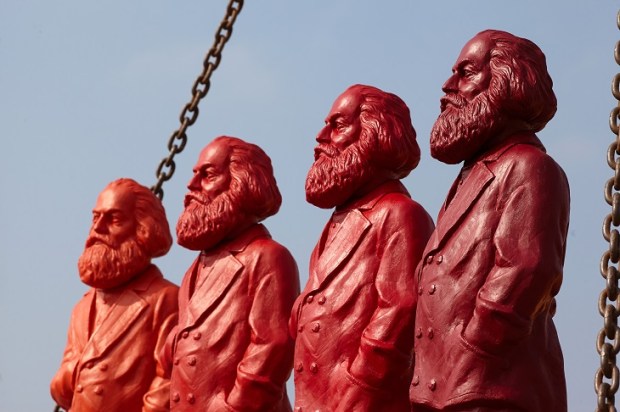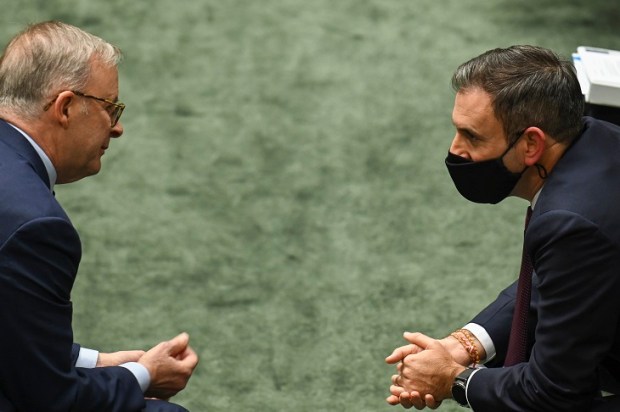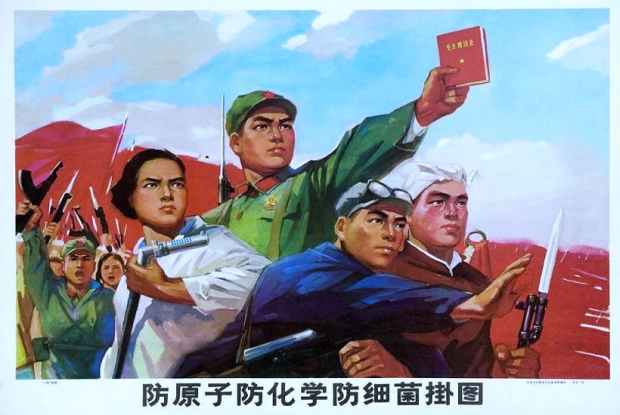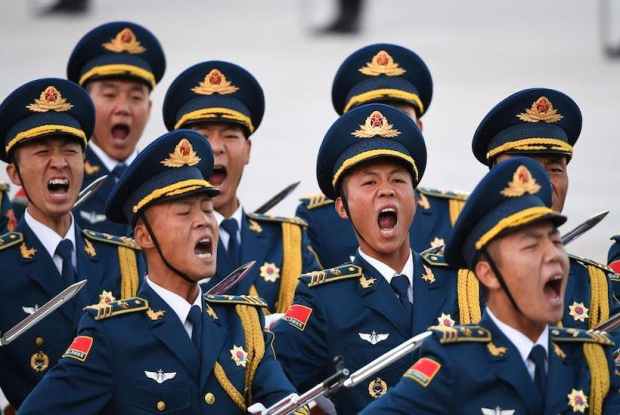Here’s a challenge for Australian Marxists.
It can be assessed that the ‘success’ of the Chinese Communist Party is, in fact, a victory for capitalism.
This proposition is surely counter-intuitive. But so too, much of what Australian Marxists say is counter-intuitive. They say that there has only ever been one successful proletarian revolution – namely, the Russian Revolution of 1917. Further, they say that China under the Chinese Communist Party is capitalist. These were two consistent themes I have noticed at home-grown Marxist conferences in Australia.
Consider this proposition using a Marxist perspective: Marx was correct in saying that capitalism will inevitably lead to the concentration of economic and political power. But Marx was wrong in proposing that capitalism would be overthrown by the proletariat, the working class, the exception being Russia in 1917. But even that proletarian revolution could not be sustained. Instead, history demonstrates that where an alleged proletariat conducts a successful revolution and sustains it, the outcome is not the victory of the proletariat but rather an intensely concentrated form of capitalism.
China, under the CCP, is living proof of this, let’s call it ‘Mafia Capitalism’.
Here’s my reasoning. My earlier straightforward reports are here: Reporting from the Marxist Front Line (10 April) and ‘No Compromise!’ Marxist solidarity in 2023 (16 April).
Amongst the many surprises I have learned was that the home-spun Australian Marxists consider that, under the Chinese Communist Party (CCP), China is a capitalist power.
I’ll admit to doing a double take when first hearing this expressed. It didn’t fit my pre-conceived assumption that Marxists would view the CCP as, well, Marxist. But as the ‘China is capitalist’ position was restated quite frequently and received general head-nodding from conference participants at some events, it became clear that there was near-universal agreement.
Of course, the entire idea of China being capitalist initially seems incredibly counter-intuitive given the CCP’s claim to be Marxist-Leninist with Mao Zedong thrown in. So, what’s going on in Marxist/Leninist/Mao/and related thought processes? It seems confusing. But it’s crucially important to attempt some understanding given the rising global power of China and the seeming rejuvenation of Marxism/socialism across much of the Western world, Australia included.
It’s best to first step back from Australia and consider the history of the current CCP leaders. This will give us some context. The starting point is the 1989 Tiananmen Square protests and massacre, the history of which has been effectively purged from China’s official historical records.
On 4 June 1989, after extended freedom reform protests across China, the CCP ordered the army to suppress the protesters gathered in Beijing’s Tiananmen Square. Although the exact figures are unknown, it is estimated that thousands were massacred or arrested. The Number Two leader in China at the time, Premier Zhao Ziyang, was a reformer. He’d met with the protesters in Tiananmen Square and proposed accommodating their demands for the future of China. Such reforms might have moved China in a free-market, democratic direction.
But the old Mao revolutionary comrades would have none of Ziyang’s vision and, in conjunction with the Tiananmen massacre, deposed and arrested him. Ziyang then spent the rest of his years under house arrest. He wrote secret diaries that were smuggled to the West and published.
Zhao’s diaries are of major importance. They grant the reader insight into the inner workings and thoughts of the CCP’s top machine men. These are the men who control China. In summary, the CCP’s power-brokers were appalled at the unfolding collapse of the USSR under pro-reformer Mikhail Gorbachev in the 1980s. Zhao’s diaries reveal that the suppression of dissent was central to the CCP’s view of its very capacity to exist. Nothing could be allowed to disturb the CCP’s iron grip over China. To lose control would herald the break-up of China into independent states, as had occurred with the USSR. That core view within the CCP remains central to understanding China today.
The immediate aftermath of the Tiananmen massacre was that China became a pariah state, shunned globally. But then things changed. China sought to ‘modernise’. After the Berlin Wall collapsed in 1989 and the seeming decade-long euphoric supremacy of the Reagan/Thatcher neo-liberal era, China eventually reached out. Pariah status was dropped.
The ‘free world’ grabbed what was viewed as an economic opportunity with the hope of a workable peace in which China adhered to the accepted world economic rules and order. This is explained in the autobiography of Henry Paulson, CEO of Goldman Sachs from 2000 to 2006, and then head of the US Treasury to 2009.
The 2015 book, Dealing with China, details how pivotal the free world’s involvement was in making China the economic powerhouse it is today. Paulson and Wall Street leaders guided the CCP to reform their state-owned businesses through massive public floats. They taught the CCP bosses and cadres the practices of capitalism, market, and commercial opportunity. The CCP were eager learners, albeit on their terms.
The fact is that China was only ever able to achieve its economic miracle because the capitalist titans of Wall Street and their followers wanted and enabled this. That is, the CCP was only able to modernise China because the arch-enemies of Marxism, the Wall Street, and global capitalists, guided, educated, and financed the CCP, effectively teaching the CCP cadres how to be capitalist. Can this perhaps be seen as a victory of capitalism over the (Chinese) proletariat?
It is often argued that Western capitalists did this out of self-interest. There was a strong hope in the free-market, capitalist West that an open, economically free, and globally engaged China would transition to some form of non-authoritarian governance. That hope was held almost universally across the free world.
What can now be understood to have actually happened instead was a Chinese economy that exploded in size, not on free-market principles but on neo-mercantilist principles. Put simply, China became the world’s factory, using its massive cheap labour supply to produce and flood the globe with cheap products. This was good for the Chinese population as it produced expanding wealth. It also drove prices down across the globe, taming global inflation for several decades.
But this Chinese economic expansion and opening up to the world must be understood within the context of the CCP’s iron grip on the country. This was not and is not a case of free-market capitalism intersecting with a Western idea of democracy and open and transparent governance. Chinese capitalism is centrally controlled capitalism subservient to the maintenance and expansion of the authority and wealth of a privileged controlling class, the comrades of the CCP.
In comparison, free-market capitalism is a form of constrained capitalism. Free-market capitalism recognises the very thing that Marx said happens, that capitalists will concentrate power and eliminate competitors to achieve monopoly. The easiest, simplest way to understand free-market capitalism is that a regulatory environment is created that allows capitalists to aspire to monopoly but always frustrates the achievement of monopoly. This regulatory process is complex, imperfect, and subject to political interference – but at least focused on what it needs to do.
Western capitalism, particularly American capitalism, learned its lesson about unrestrained capitalism from the experiences of the great Gilded Age of the late 1800s. It was a period of massive US economic expansion dominated by the Robber Barons of finance and industry. The names of these great capitalists resonate today: the likes of JP Morgan, Vanderbilt, Carnegie, and Rockefeller. These capitalist giants became super rich in a way that has been legislated against in the decades since.
The businesses practices of John D. Rockefeller Snr are chronicled in Titan: The Life of John D. Rockefeller Snr. Rockefeller built his oil conglomerate Standard Oil until it controlled 90 per cent of the US oil market. Had Rockefeller and his senior executives operated in today’s business regulatory environment, they would arguably not have been able to achieve such extensive market dominance. Rockefeller has long proclaimed that his business operated on the highest of moral principles and motivations, but ultimately, Standard Oil was broken up in 1911 when the US Supreme Court ruled that Standard Oil was a monopoly.
The point to be made is that Western thought has, since at least the late 1800s, considered that unrestrained capitalism, best demonstrated by monopoly, is bad for society. The rule of law together with government and social/economic institutions work to frustrate monopolistic capitalism in a system best described as the free market. It’s not perfect. It’s always a struggle. Every epoch involves that struggle. Today the age of the Internet presents new challenges posed by the power and influence of Microsoft, Google, Amazon, Facebook, and more.
But free-market capitalism at least recognises and seeks to address the issue. It has, it can be argued in Marxist parlance, sought to address the exploitation of the people by capitalism by giving the proletariat (the people) at least some measure of control over capitalism, even if those constraints are fractured and haphazard.
However, and in stark contrast, CCP-Chinese capitalism is everything Marx said capitalism would be or become. That is, that capitalists would eliminate competition and centralise power. This is what has occurred in China. The ruling class is the capitalist CCP. Marx predicted that the capitalist ruling class would be destroyed through revolution, but this has certainly not happened in China.
The CCP took control of China in 1949. Under Mao, the experiment in the proletarian revolution produced destruction, poverty, and death on a grand scale. It failed. The post-Tiananmen Square modernisation was without doubt, and with the admissions of the Australian Marxists, a capitalist modernisation. But a capitalism tightly managed and controlled by the CCP, particularly after the Global Financial Crisis of 2008.
One illuminating way to look at CCP-Chinese capitalism is to think of it as being a form of ‘Mafia’ Capitalism.
Mafia Capitalism is not a term used by Marx, but it is, I contend, an accurate way to describe CCP-Chinese capitalism.
By way of explanation, essentially every senior CCP leader is a multi-billionaire – either in their own right and/or in that of their family. The surest way to wealth and privilege in China is to become a member of the Chinese Communist Party. That is, to be one of an elite 96 million-or-so CCP Chinese in a population of 1.4 billion.
The family connections at the top of the CCP are small and tight. This is a result of many decades of the one-child policy. Senior CCP cadres, primarily revolutionary comrades of the 1949 revolutionary success, accumulated huge personal and family wealth under the post-2000 neo-mercantilist economic growth described above.
Yes, the Chinese economic miracle created a massive middle class in record time. But the really serious wealth went to, and still goes to, the top of the CCP tree. The higher up the tree, the more money. During the great economic expansion period there was an appearance of individual entrepreneurship. But the reality was, and remains, that no successful businessperson in China achieved or maintained wealth without being a serious CCP cadre or having close financial relationships with CCP cadres. Any business without such connections would come crashing down if it ran afoul of a CCP cadre or person connected with a cadre.
This explains the existence of the famous class of Chinese princelings – the descendants of senior CCP cadres and the only children of these cadres. The princelings are inheritors of vast political power and wealth. They, their families and comrade cohorts operate as a ruling class mafia. Combined together as the CCP they are the ruling class of China.
Human nature and behaviour at its core remain constant across all cultural, ethnic, and geographic divides. The great American film trilogy, The Godfather, may have been set in New York, but it could have just as easily been set in Beijing and covered the operations of the Chinese Communist Party.
Zhao Ziyang’s secret diaries could readily form the basis of a remake of The Godfather, but with Chinese characteristics set in Beijing. That is, to watch The Godfather is to gain an understanding of the inner thoughts, motivations, relationships, and behaviours inside a mafia organisation. These are the same thoughts, motivations, relationships, and behaviours operating inside the CCP. This is Mafia Capitalism.
But there’s a very big difference between The Godfather and the CCP mafia. The Godfather mafia operated as a gang defying the rule of law in the nation/s in which it operated. The nation-state/s sought to constrain, control, and eliminate the mafia. CCP mafia capitalism, by comparison, sets and controls the operations of the law in China. The CCP is the state called China. In other words, CCP mafia capitalism runs China. There is no countervailing constraint.
But there’s a deeper twist to this thesis.
Australian Marxists often assert that China is a capitalist economy/nation. Yet the CCP’s capitalism, as explained by the CCP, is wrapped up in Marxist explanation and ideological thought, or at least dramatic twists on Marxist thought. It’s extremely odd.
The CCP claims to be Marxist/socialist, yet the CCP operates as a mafia ruling over China’s capitalism. But the CCP’s neat trick for dealing with this is the branding of its mafia capitalism as ‘socialism with Chinese characteristics’.
The pinnacle of this explanation lies in the seminal 2013 speech of paramount leader Xi Jinping where he lays out the principles of ‘socialism with Chinese characteristics’. This is expanded on in his four-volume series on the governance of China. Attempting to read just Volume 1 (published in 2015) is a slog. It has an almost infantile style and, for an outsider, a seemingly impenetrable coded language. (Mao Zedong’s Little Red Book was much easier to digest. But of course, Mao was not a Mafia Capitalist.)
Although to the outsider Xi’s declaration of socialism with Chinese characteristics seems infantile, for socialists it is a sophisticated reworking of Marxist dogma. And just as Marxist reasoning has inbuilt, circular inconsistencies, Xi’s declarations can presumably work on those inconsistencies to create a socialist paradigm equating to and justifying CCP mafia capitalism without using the term capitalism.
Back to Marxist conferences held within Australia.
Speakers and participants come across, pretty universally, as agreeing that China is a capitalist economy. But in saying this there wasn’t vitriol directed towards China in the same way that spite is directed toward United States capitalism. Almost no anger was directed at China.
By comparison, Australian Marxists appear to universally denounce Russia as an imperialist aggressor in the war against Ukraine. But it’s probably obvious that such condemnation was/is ideologically safe because Putin’s Russia could in no way be described as Marxist. Instead, Putin’s Russia is viewed as an extreme and overtly brutal, murderous regime operating within a capitalist orbit. Similar condemnation was directed at Iran.
These views of capitalism in Russia, Iran, and China were all covered within the context of the Marxist view that war is exclusively a result of the inevitable clash of capitalist nations. Capitalism is the problem, say the Marxists.
Even so, there was an undertone of politeness toward the CCP, even in the acceptance and recognition of Chinese capitalism. There were a considerable number of attendees who appeared to be Chinese, all generally of younger age groups (say, in their 20s and 30s). There was much earnest note-taking at one conference. There were some very good sessions with speakers participating via Zoom from Hong Kong and so forth, commenting on China. On the surface, such speakers were providing critical analysis of Chinese economics, which invariably could involve, at minimum, implied political comment.
Question. How does a Hong Kong-based commentator on Chinese economic issues, comment in such a way that they avoid being arrested? China is well known for arresting journalists, academics, and anyone who seemingly steps across an (invisible) line. Long-detained Chinese-Australian journalist Cheng Lei is but one example. But some ‘pennies’ dropped. Little ‘lights went on’ while absorbing the discussions.
The observation is that the Mafia Capitalism of China is wrapped in this coded Marxist language. If an individual is to survive, exist, even benefit in China, there’s a clear rule that needs to be followed.
Simply, never say, do, write or even think anything that could in any way be interpreted as threatening or questioning the supremacy and rights of the ruling class – that is, the Chinese Communist Party members, the Mafia Capitalists – to exercise absolute and total control over everything that happens in China.
This rule equally applies to any individual, business (not in China) or nation that wants to do business with CCP China.
Within that framework, every individual in China and anyone wanting to trade with China is free to do what they want. But there’s a catch.
What thought, word, or action could be interpretated as challenging CCP supremacy is not always clear and can and does change even without that change being flagged or declared. Therefore, there is another desperate need – namely, to study, understand, and learn to think and act within the ambit of the CCP’s coded Marxist-like language to keep up to date with it.
Here, then, I repeat the challenge to Australian Marxists and their view of life.
Assuming the acceptance of CCP China as a capitalist state, does not CCP China demonstrate that Marx’s proletarian revolution inevitably results in the victory of capitalism? And not just that, but a particularly concentrated form of capitalism, Mafia Capitalism? That is, that Marxist revolution ultimately results in the defeat of the proletariat.
Ken Phillips is Executive Director of Self Employed Australia and publishes on Substack


